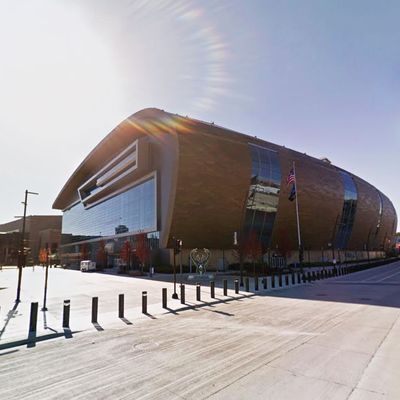
The Democratic National Committee announced on Monday that it will hold the party’s 2020 national convention in Milwaukee, Wisconsin, which beat Miami in the final stages of the competition for this pricey but prestigious event.
The convention will be held on July 13–16, six weeks before the Republican convention in Charlotte, North Carolina.
Convention site decisions are complicated affairs, with logistical and financial feasibility being a threshold factor. Milwaukee’s limited hotel capacity (compared to Miami and the other semifinalist, Houston) was a concern.
But in the end, politics likely trumped (so to speak) every other consideration. Wisconsin was one of the states that helped the 45th president win in 2016, the first time the state had gone Republican since the Reagan mega-landslide of 1984. And it’s part of the region that an awful lot of Democrats think will determine the general election of 2020. Indeed, Milwaukee’s convention win owed a lot to its becoming a midwestern regional candidate, as Politico notes:
In August, a coalition of Midwestern senators from Minnesota to Indiana to Ohio signed on to a letter to the DNC calling for a Milwaukee selection.
“Democrats have not held a convention in the Midwest since 1996, and a Milwaukee convention would send a strong message to the nation that winning America’s heartland is a priority in the 2020 election cycle and beyond,” the group of senators wrote.
There’s actually at best mixed evidence that holding a national political convention in a particular place helps a party win it in the general election. Donald Trump did do very well in Ohio in 2016 (winning it by eight points), but the Democratic convention in Philadelphia didn’t keep Hillary Clinton from losing Pennsylvania (nor did the 2012 Democratic convention in North Carolina win that state for Obama). Democrats did carry Colorado in 2008 after a Denver convention, but Obama’s national margin of victory made that unsurprising. Recent Republican conventions in San Diego (1996), Philadelphia (2000), New York (2004), St. Paul (2008), and Tampa (2012) didn’t flip any of the host states.
One academic analysis of the general-election impact of convention siting concluded it might energize a party’s voters in the immediate media market, but could also produce a backlash:
Our research into the local effects of conventions suggests that the parties could help or hurt themselves depending on the city in which they choose to convene. The impact depends on the politics of the surrounding areas. The intense up-close experience of the convention should solidify the preferences of local voters who are predisposed to support the party, persuade some voters who would have otherwise voted for the other party, or create a backlash against the party with voters who support the other party. In other words, we suspect the increased information flow due to being in the convention’s media market impacts low-information and politically disengaged voters who are the most susceptible to campaign stimuli. Therefore, the local effect will depend on the political composition of the area around the convention.
Metropolitan Milwaukee is famously one of the most politically polarized (and racially segregated) urban-suburban areas in the country. So there could be a backlash effect within the local media market to four days of infanticide-mad “socialist” Democrats cavorting in the neighborhood. But that’s unclear. This is the first national party convention to be held in Milwaukee, so local excitement may tilt positive. And without question, holding the confab in Wisconsin will produce a nice backdrop for whatever Rust Belt–centric messaging the Donkey Party can undertake.
Though national party conventions are normally the most tightly controlled events of the presidential election cycle, sometimes things go wrong or get weird. Financial fears about convention costs or even local traffic disruptions can dull any feel-good effect. Republicans lost an entire day of their 2012 convention in Tampa to a tropical storm threat. And discord within a convention can occur despite the best efforts of organizers. Democrats planning Milwaukee may be fretfully looking at the large presidential candidate field and hoping the primaries produce a relatively quick winner. There’s no guarantee of that, particularly in a party that won’t allow field-winnowing winner-take-all events.
So Milwaukee ’20 could provide a key local or regional boost for Democrats going into a general-election crusade to unseat Donald Trump, or have little net effect. But for the delegates, alternates, volunteers, activists, and media folk gathering there next July, the best news may be that the city boasts unusually temperate midsummer weather. If there’s extreme heat, it may come from what’s going on inside Fiserv Forum.






























